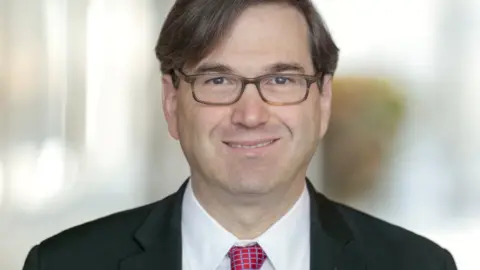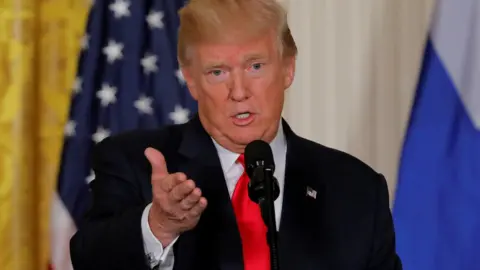US tax reform: Tough task for Trump says former Obama adviser.
 Peterson Institute for internatinal economics
Peterson Institute for internatinal economicsChanging the US tax system will be very hard for President Trump, says a former leading adviser to the White House.
Mr Trump is expected to outline more of his thinking on such changes on Wednesday, after making the idea a cornerstone of his election campaign.
Jason Furman, the former chairman of the Council of Economic Advisers to President Obama, spoke to the BBC Radio 4 Today programme.
He said President Trump had a tough job on his hands.
"Reform has winners and losers, and often the losers feel the pain in a very specific concentred way, the winners are more diffuse and that makes it easier for the losers to organise," Prof Furman said.
"[Also] I think there are some benefits to tax reform but I don't think they are so huge that it absolutely has to happen."
Loopholes
President Trump made tax "reform" a cornerstone of his economic policy during his election campaign, and has continued to stress its importance amid the administrative chaos and apparent policy failures of his presidency so far.
The idea of changing the complicated US taxation system, for both companies and people, has been bandied about for many years.
But the last substantial change was 30 years ago, indicating, according to Prof Furman, how hard it was to achieve.
And he pointed out that in fact there are two broad conceptions of what "reform" actually means, and that it was still not clear to which one the president was referring.
"The president has been on both sides of that issue so it's a bit unclear exactly what his motivation is," said Prof Furman, who is now Professor of Economic Policy at Harvard Kennedy School.
He said the first conception involved taking away a lot of loopholes and a lot of inefficient parts of the US tax code and lowering the overall tax rate.
That would benefit the United States, especially US companies, which currently have to pay a corporate tax rate of 35%.
 Reuters
Reuters"Much higher than in the UK, or almost any other country in the world," the professor said.
The second idea of tax cuts, he explained, involved believing in shrinking the size of the government and changing the distribution of income.
"That's a more ideological issue," said the professor.
He added: "Given the size of the debt in the United States, even lot of conservatives are sceptical of it right now; there's a division within the Republican party, of those who want to do tax reform, get rid of loopholes and lower the rates, and those who want to do tax cuts."
The big oddity in the US tax system, explained the professor, was that the US government pretends to tax corporate profits from overseas.
In theory those earnings should be taxed at 35% but in reality they are not taxed at all unless they are brought back to the US, a feature which the president has suggested should be addressed by a lower tax rate.
"Surprise, surprise, those companies don't actually bring any of that money back to the United States," said Prof Furman.
"If we fixed that system, we could get more money and pose less of a distortion for those companies... maybe tax them at a moderate rate and actually collect the money," he added.
So what is the problem?
Prof Furman said that changing the US tax code would involve taking on some sacred cows currently supported by some Republican politicians, while Democrats would probably have no interest in offering President Trump support on anything.
Thus the political arithmetic is against the President.
"There is a very, very small margin for error. If you lose just three Republicans in the Senate, or a little bit over 20 Republicans in the House [of Representatives], you can't pass your tax reform if you don't have Democratic votes," the professor pointed out.
